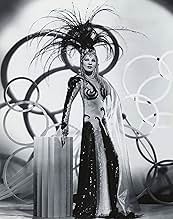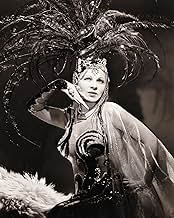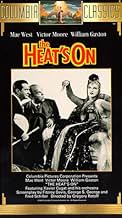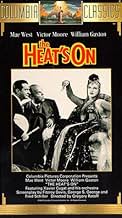When his biggest star joins a rival's show, a Broadway producer bluffs and schemes to get her back.When his biggest star joins a rival's show, a Broadway producer bluffs and schemes to get her back.When his biggest star joins a rival's show, a Broadway producer bluffs and schemes to get her back.
Leon Belasco
- Shore - the Agent
- (uncredited)
Beatrice Blinn
- Babette
- (uncredited)
Featured reviews
Although Mae West receives first billing, she is not on screen long enough to make this misfire worth seeing. Even when she is on display and looking svelte and glamorous at 50, her lines lack the double-entendres and sly delivery of her best work. The silly goings on in this back-stage "comedy" revolve around financing a theatrical production with money from a blue-nose group whose goal is to suppress such shows. The plot is muddled at best, ridiculous at worst, and the cast lacks either a romantic lead such as Cary Grant or a comic like W.C. Fields for Miss West to play off. The production numbers for the most part are forgettable, even when Mae West delivers the songs. The one exception is the dazzling piano playing by Hazel Scott. Her number with two pianos is nothing short of astonishing and almost makes the dreck one has to endure before her appearance almost bearable. Unfortunately, Scott has only two numbers, but mercifully the film ends rather abruptly not long after she exits the screen. "The Heat's On" is certainly an ironically mis-titled film considering the heat that West generated in her early work, and the movie is only for die-hard West fans who are interested in seeing everything that she appeared in. Entertainment seekers and non-West fans beware.
Broadway star Fay Lawrence (Mae West) wants out of her contract with producer Tony Ferris (William Gaxton). She can do it if the show does badly. A society foundation shuts them down and she jumps to rival Forrest Stanton. Tony is willing to do anything to get her back including using the same foundation and its hapless vice president Hubert Bainbridge (Victor Moore) who wants to help his niece's performing ambitions.
This is Mae West's last theatrical release before making a semi-return some three decades later. She delivers her style of comedy with less sexuality. There is some music. The songs may be appealing to some. For most of this, the lead character is actually Ferris. He's not that compelling or appealing with all his scheming. If this was written by Mae West, she would probably be the lead from the start. She does take over in the last act and that's a good section. If only the movie has more of those.
This is Mae West's last theatrical release before making a semi-return some three decades later. She delivers her style of comedy with less sexuality. There is some music. The songs may be appealing to some. For most of this, the lead character is actually Ferris. He's not that compelling or appealing with all his scheming. If this was written by Mae West, she would probably be the lead from the start. She does take over in the last act and that's a good section. If only the movie has more of those.
At 49, Mae West appeared in this bagatelle produced and directed by her friend, Gregory Ratoff, who needed a name actor to justify the production, but the main character is a hapless bumpkin, well played by Victor Young. Nearly three decades passed before she appeared in another movie. Even more odd was the brief career, as an actress, of pretty, charming Mary Roche, who played Young's niece, although she went on to work as a hair stylist on eight features, three of them very important ones, beginning with "On the Waterfront" (1954). This story of an attempt to put on a Broadway show goes in one ear and out the other, except for Xavier Cugat and his orchestra and the amazing piano playing of Hazel Scott, who even plays two pianos at once.
THE HEAT'S ON (Columbia, 1943), directed by Gregory Ratoff, gives some indication as to how the use of a major star heading the cast might promote theatrical attendance, but the final result turns out to be a demotion of its reputation. The star in question is Mae West returning to the big screen after a three year hiatus following her western comedy classic of MY LITTLE CHICKADEE (Universal, 1940) opposite W.C. Fields. Appropriately titled, especially for a Mae West movie, THE HEAT'S ON should be categorized as a Mae West movie not to be a Mae West movie. A throwback to her motion picture debut of NIGHT AFTER NIGHT (Paramount, 1932), where West's character arrives late into the story, allowing the leading actors, as headed by George Raft, to be showcased to best advantage in his first starring role, but at least with West's limitations reciting her own one-liners made the movie watchable. For this production, she surprisingly has very little to do, practically taking the back seat to other performers, and in spite of some of her traditional witty one-liners, usually the best part of her movies, there isn't enough of her or her sayings to produce any highlights. In one scene, West says "If I stay with this show, I'll ruin my reputation." A pity she didn't take her own advice. Eight movies and 11 years later, Mae West continued to receive star billing above the title, but this time has her name shared along with Victor Moore and William Gaxton. Now at age 50, and appearing physically younger than in her previous films, especially now sporting a Betty Grable-type headdress, but never exposing her legs wearing those long styled dresses, there's very little of her to recommend. Had this Columbia musical starred studio contract players as Ann Miller or Evelyn Keyes, then THE HEAT'S ON would have been just another one of those hundreds of slightly entertaining hodgepodge musicals churned out during the World War II era, but with Mae West's name on the marquee, the final result is quite disappointing.
Story: Believing that her forthcoming musical, "Indiscretions" is destined to flop, its leading actress, Fay Lawrence (Mae West), decides to leave producer Tony Ferris (William Gaxton), to star in a revue, "Tropicana," for rival producer Forrest Stanton (Alan Dinehart). Following the opening minutes which sets the pattern to the story, the duration revolves mostly around Tony trying to get Fay back while Fay sits inside the theater with Stantion to watch numerous talented celebrities auditioning in musical acts planned for the show. In between acts, the story shifts over to Hubert Bainbridge (Victor Moore), a middle-aged man attempting to get his niece, Janie (Mary Roche) to be headlined in Tony's show. In spite of his moral-minded sister (Almira Sessions) wanting to close the show, Janie really prefers her soldier boyfriend, Andy Walker (Lloyd Bridges), than a show business career anyway, thus leaving Tony with no headliner.
On the musical program, songs include: "I'm a Stranger in Town" (sung by Mae West); Specialty number conducted by Xavier Cugat with Lina Romay vocalizing in Spanish; "There Goes That Guitar, There Goes My Heart," "Antonio" (both sung by Romay); "The White Keys and the Black Keys" (sung and performed by Hazel Scott on piano); "Thinking About the Wabash" (sung by Mary Roche and male singer); "The Cailssons Go Rolling Along" (a military number sung by Hazel Scott/ performed by black soldiers); "They Looked So Pretty on the Envelope" (sung by Victor Moore); "Hello, Mi Amigo" (finale with Mae West and chorus). So many songs, none for the hit parade.
Out of circulation on the television markets in nearly 40 years, and distributed on video cassette for a limited time during the early 1990s, THE HEAT'S ON was resurrected again, thanks to Turner Classic Movies cable channel, where it premiered the evening of April 25, 2005. In spite of many negative reviews, then and now, it's good having it resurrected again mainly because Mae West had taken part in it. After viewing THE HEAT'S ON, it's quite understandable why West preferred to ignore it as part of her filmography. But the failure should not be blamed entirely on West. According to Bob Osborne's opening and closing statements, West had no say in the matter, having committed herself into doing this without reading the script, simply as a favor to director Gregory Ratoff (who played her Russian attorney in one of her best comedies, I'M NO ANGEL back in 1933). The only thing going for THE HEAT'S ON is the humorous scene involving West as she entertains Victor Moore in her boudoir by dancing the rumba, and at the same time, he trying to keep his toupee from clipping off. There are some instances near the start of the story where West is expected to make a nifty comeback in between conversations with Gaxton, but with some of the wittier lines going to Gaxton, there appears to be either abrupt fade-outs or cuts to the next scene to prevent West from saying anything worth hearing. Some West quips have made it to the finished product, others haven't. A pity.
With this almost marking the end to Mae West's movie career, this would not be her finish, not by a long shot. She continued to perform on stage and night clubs throughout the years, returning to the big screen with MYRA BRECKENRIDGE (1970) and SEXTETTE (1978), none recapturing the magic she fulfilled during the Depression era 1930s, the sort of movies West fans prefer to remember her best. (**1/2)
Story: Believing that her forthcoming musical, "Indiscretions" is destined to flop, its leading actress, Fay Lawrence (Mae West), decides to leave producer Tony Ferris (William Gaxton), to star in a revue, "Tropicana," for rival producer Forrest Stanton (Alan Dinehart). Following the opening minutes which sets the pattern to the story, the duration revolves mostly around Tony trying to get Fay back while Fay sits inside the theater with Stantion to watch numerous talented celebrities auditioning in musical acts planned for the show. In between acts, the story shifts over to Hubert Bainbridge (Victor Moore), a middle-aged man attempting to get his niece, Janie (Mary Roche) to be headlined in Tony's show. In spite of his moral-minded sister (Almira Sessions) wanting to close the show, Janie really prefers her soldier boyfriend, Andy Walker (Lloyd Bridges), than a show business career anyway, thus leaving Tony with no headliner.
On the musical program, songs include: "I'm a Stranger in Town" (sung by Mae West); Specialty number conducted by Xavier Cugat with Lina Romay vocalizing in Spanish; "There Goes That Guitar, There Goes My Heart," "Antonio" (both sung by Romay); "The White Keys and the Black Keys" (sung and performed by Hazel Scott on piano); "Thinking About the Wabash" (sung by Mary Roche and male singer); "The Cailssons Go Rolling Along" (a military number sung by Hazel Scott/ performed by black soldiers); "They Looked So Pretty on the Envelope" (sung by Victor Moore); "Hello, Mi Amigo" (finale with Mae West and chorus). So many songs, none for the hit parade.
Out of circulation on the television markets in nearly 40 years, and distributed on video cassette for a limited time during the early 1990s, THE HEAT'S ON was resurrected again, thanks to Turner Classic Movies cable channel, where it premiered the evening of April 25, 2005. In spite of many negative reviews, then and now, it's good having it resurrected again mainly because Mae West had taken part in it. After viewing THE HEAT'S ON, it's quite understandable why West preferred to ignore it as part of her filmography. But the failure should not be blamed entirely on West. According to Bob Osborne's opening and closing statements, West had no say in the matter, having committed herself into doing this without reading the script, simply as a favor to director Gregory Ratoff (who played her Russian attorney in one of her best comedies, I'M NO ANGEL back in 1933). The only thing going for THE HEAT'S ON is the humorous scene involving West as she entertains Victor Moore in her boudoir by dancing the rumba, and at the same time, he trying to keep his toupee from clipping off. There are some instances near the start of the story where West is expected to make a nifty comeback in between conversations with Gaxton, but with some of the wittier lines going to Gaxton, there appears to be either abrupt fade-outs or cuts to the next scene to prevent West from saying anything worth hearing. Some West quips have made it to the finished product, others haven't. A pity.
With this almost marking the end to Mae West's movie career, this would not be her finish, not by a long shot. She continued to perform on stage and night clubs throughout the years, returning to the big screen with MYRA BRECKENRIDGE (1970) and SEXTETTE (1978), none recapturing the magic she fulfilled during the Depression era 1930s, the sort of movies West fans prefer to remember her best. (**1/2)
5tavm
Well, after 40 years of reading about this movie, my curiosity has finally been settled! Her last movie before this one-My Little Chickadee-having been released three years previous, Mae West makes one more picture before taking a 27-year sabbatical from Hollywood. However, because she didn't write her material like before, she doesn't have much witty lines and in fact, has small screen time despite her above-the-title billing which she shared with William Gaxton and Victor Moore, both of whom have more scenes. It's with Moore that Ms. West has her one good scene with as she manages to get him drunk while he reveals the crux of the plot. Otherwise, this film is just an excuse to provide musical numbers of either Mae, Xavier Cugat and his Orchestra, or the excellent singing and piano skills of Hazel Scott and excellent Ms. Scott really is! If anyone makes this picture worth seeing, she does! P.S. Lloyd Bridges has a small role as a soldier who visits his girlfriend played by Mary Roche who's only appearance on film this was.
Did you know
- TriviaThis was Mae West's final film until Myra Breckinridge (1970) 27 years later.
- GoofsOn a wall of a producer's office is a presumably old publicity shot of Fay wearing an elaborate headdress that she doesn't actually wear until she performs a musical number later in film for an entirely new production staged by rival producer.
- Quotes
Fay Lawrence: [singing] If you want things put in order, Come and see me south of the border...
- SoundtracksI'm Just a Stranger in Town
(1943)
Music by Jay Gorney
Lyrics by Henry Myers and Edward Eliscu
Copyright 1944 by Mills Music Inc.
Performed by Mae West (uncredited) in the show "Indiscretions"
Details
- Release date
- Country of origin
- Languages
- Also known as
- Sinfonías dislocadas
- Production companies
- See more company credits at IMDbPro
- Runtime1 hour 19 minutes
- Color
- Aspect ratio
- 1.37 : 1
Contribute to this page
Suggest an edit or add missing content




































